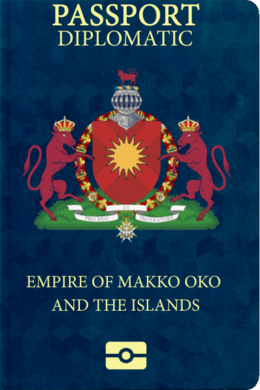Makkonian Passport
| Makkonian passport | |
|---|---|
 Front cover of the 2027 Makkonian Diplomatic Passport | |
| Issued by | Emperor's Passport Office |
| Valid in | All nations |
| Type of document | Passport |
| Purpose | Identification |
| Eligibility requirements | Makkonian nationality |
Makkonian passports are passports issued to citizens of the Empire of Makko Oko and are issued almost exclusively by the Emperor's Passport Office, an agency of the Ministry of Diplomatic Affairs. Per the Nationality & Travel Act, any person that holds a Makkonian passport must use it for both entering and exiting the empire. Notably, unlike other passports of other nations, His Emperor's Government recognizes a passport as proof of citizenship.
While the law does not prohibit holding passports of other governments, it is prohibited to be a citizen of more than one nation while also being a citizen of the empire. The passport entitles citizens to consular assistance abroad at Makkonian embassies and protection therefore. Passports are guaranteed to almost any citizen who pays because of the guaranteed freedom of movement enforced by the Constitution.
History
Passports were issued as early as 1940 as evidence that they had passed the blood ceremony and were thus guaranteed the rights codified under the bill of rights. The passport was a simple piece of paper with an authority's signature emblazoned on it. Forgeries from those less fortunate were rampant during this time up to its abolishment six years later. Passports would later be reinstated upon the start of the Great Santian War in 1950 and was used to discriminate against the citizens and non-citizens, which would later evolve into the modern border controls that all nations have today.
When the Republic of Makko Oko was established on July 30th, 1964, passports became a national government-only function, removing the right to issue them from the cities, which had originally been the issuers after 1950. At the same time, the government started recognizing passports from Liberto-Ancapistan and others, establishing the first border controls and with that, the first restrictions on immigration. Until the abolishment of chattel slavery in 1982, slaves were mandated under the law to hold a "Enslavement Passport" which was a type of passport specifically for slaves that forbade them from leaving the nation without permission from their owner and also restricted their rights domestically. The passport was considered to be proof that they were a slave.
The design and content of the passport has changed over the years. From 1940 to early 1978 passports issued were not machine-readable, and biometric passports would exist starting in 2003, with machine-readable passports being discontinued in 2006. In early 2020, after the end of the civil war, the empire started issuing machine-readable passports with a new look to replace the Republic-era biometric passports. The international community heavily denounced the move, and a new biometric passport was ultimately unveiled in October 2021. The passport would get an updated look in 2027 after Imperial Prince Andrew Woo joined the cabinet as the Minister of Diplomatic Affairs.
Administration
Authority for issuing passports is conferred on the Minister of Diplomatic Affairs, who oversees the Emperor's Passport Office established by the Nationality & Travel Act. The ministry, along with the passport office, has issued regulations governing such passports. Citizens can apply for a passport at any courthouse on the soil of the empire, or in addition, can apply at the more than 300 passport offices across the nation.
Restrictions
It is unlawful to enter or exit the empire as a citizen and not use your national passport to do so per the Nationality & Travel Act. A passport or one's right to bear one, can be restricted or prohibited as the government sees fit under the law. Notably, a valid reason must exist for seizing a currently valid and already-issued passport, as affirmed by the Supreme Court in Vanita Marissen v. Ministry of Diplomatic Affairs et al. (2027). The lack of a valid passport prevents citizens from being able to leave the soil and consequently can make it more difficult for a citizen to return, however not impossible.
Requirements
Types
Regular Passport (red cover)
Issuable to all citizens. Periods of validity: generally 10 years from the date of issue; for those under 18, generally five years from the date of issue.
Diplomatic Passport (blue cover)
Issuable to Makkonian diplomats accredited overseas and their eligible dependents, to citizens who reside in the empire and travel abroad for diplomatic work, to the Monarch and the Imperial Family as well as to members of the executive cabinet and anybody that the Monarch or Minister of Diplomatic Affairs shall designate. Period of validity: Generally 10 years from the date of issue.
Travel-Restricted ("Limited") Passport (black cover)
Issuable to all citizens in times of war, and issuable to all convicts and certain travel-restricted persons in peacetime. Period of validity: Generally 5 years from the date of issue.
Official Passport (yellow cover)
Issuable to any citizen traveling on behalf of the Monarch, the Imperial Family or His Emperor's Government on official business. Period of validity: Generally 4 years from the date of issue.
Discontinued Types
Offenders Passport (black cover)
Issuable to all convicts, it was discontinued and merged with the already-existing Limited Passport in 2027. Period of validity: Generally 1 year from the date of issue.
